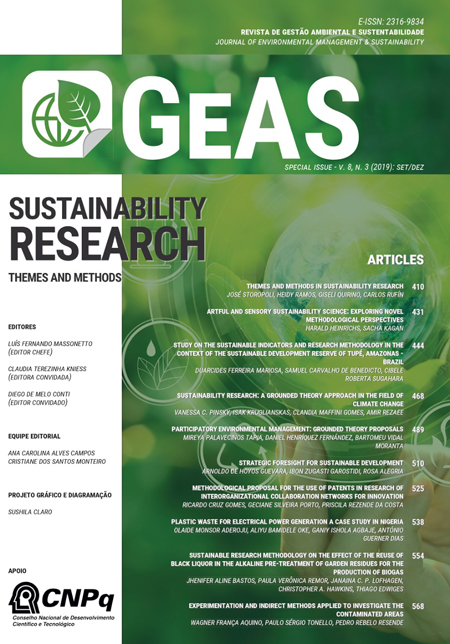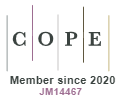SUSTAINABILITY RESEARCH: A GROUNDED THEORY APPROACH IN THE FIELD OF CLIMATE CHANGE
DOI:
https://doi.org/10.5585/geas.v8i3.15766Keywords:
Theory building, Grounded theory, Sustainable development research, Soft science, REDD , Climate change.Abstract
Climate change is a complex and uncertain global problem because it is driven by human behavior, with long-term climate-related risks for natural and human systems. Changes in human behavior, financing flow, policy instruments, and multilevel governance are needed for mitigating and managing major climate risks. Understanding the social dimensions of climate change is, quite literally, a hot topic to be studied. Most of the scientific literature in the field is focused on the ‘hard science’. Different methods of theory building are used in applied social sciences. However, the use of the grounded theory approach in sustainability research, specially on ‘soft science’ in the field of climate change, is scarce. The intent of this paper is to discussion the use of the grounded theory method in an emergent research field that combines governance and climate change. The article presents substantive results of an emerging theoretical framework that explain the governance process of REDD+ in Brazil, an United Nations Framework Convention on Climate Change (UNFCCC) climate finance mechanism focused on mitigating forest-related emissions in developing countries. Instead of discussing best procedures and techniques to build grounded theory, which are largely accessed through several peer-reviewed publications, our focus is to provide a practical guide and discuss lessons learned from the field to integrate the ‘REDD+ Governance Theoretical Framework’. Thus, scholars and graduate students are encourage to test and validate (or not) the emerging theoretical framework.
Downloads
References
Biernacki, P., & Waldorf, D. (1981). Snowball sampling: Problems and techniques of chain referral sampling. Sociological methods & research, 10(2), 141-163.
Charmaz, K. (1983). The grounded theory method: An explication and interpretation. Contemporary field research, 109-126.
Charmaz, K. (1996). The Search for Meanings - Grounded Theory. In J. A. Smith, R. Harre, & L. Van Langenhove (Eds.), Rethinking Methods in Psychology (pp. 27–49). London: SAGE Publications. https://doi.org/10.1016/B978-0-08-044894-7.01581-5
Corbera, E., & Schroeder, H. (2011). Governing and implementing REDD+. Environmental Science and Policy, 14(2), 89–99. doi:10.1016/j. envsci.2010.11.002
Corbin, J. M., & Strauss, A. (1990). Grounded theory research: Procedures, canons, and evaluative criteria. Qualitative sociology, 13(1), 3-21.
Corbin, J., & Strauss, A. (2015). Basics of qualitative research: Techniques and procedures for developing grounded theory (4th ed.). Thousand Oaks, CA: Sage Publications.
Fatorelli, L., Gebara, M. F., May, P., Zhang, S., & di Gregorio, M. (2015). The REDD+ governance landscape and the challenge of coordination in Brazil. Bangor. Retrieved from http://www.cifor.org/library/5508/the-redd-governance-landscape-and-the-challenge-of-coordination-in-brazil/
Friese, S. (2013). Data analysis and theory-building tools. In ATLAS.ti 7 User Guide and Reference (p. 469). Berlin: ATLAS.ti Scientific Software Development GmbH. Retrieved from http://atlasti.com/wp-content/uploads/2014/05/ATLAS.ti-7-Network-Views.pdf
Glaser, B. (1978). Theoretical sensitivity. Advances in the methodology of grounded theory.
Glaser, B. G., & Strauss, A. L. (1967) The discovery of grounded theory: strategies for qualitative research. Chicago: Aldine.
Goulding, C. (2002). Grounded Theory: A Practical Guide for Management, Business and Market Researchers (1st ed.). London: SAGE Publications.
Greene, J. C., Caracelli, V. J., & Graham, W. F. (1989). Toward a Conceptual Framework for Mixed-Method Evaluation Designs. Educational Evaluation and Policy Analysis, 11(3), 225–274. doi:10.3102/01623737011003255
Hall, W. A., & Callery, P. (2001). Enhancing the rigor of grounded theory: Incorporating reflexivity and relationality. Qualitative health research, 11(2), 257-272.
Hueser, N. G. (1999). Grounded Theory Research: Not for The Novice.
Ikeda, A. A., & Bianchi, E. maria P. G. (2009). Considerações Sobre Usos e Aplicações da Grounded Theory em Administração. Faces R. Adm, 8(2), 107–122.
INPE. (2019, May 28). PRODES – Monitoramento da Floresta Amazônica Brasileira por Satélite. Available at http://www.obt.inpe.br/OBT/assuntos/programas/amazonia/prodes. Last update 11/23/2018.
IPCC. (2014). Climate Change 2014 Synthesis Report - Summary for Policymakers. Retrieved from https://www.ipcc.ch/pdf/assessment-report/ar5/syr/AR5_SYR_FINAL_SPM.pdf
Jick, T. D. (1979). Mixing Qualitative and Quantitative Methods: Triangulation in Action. Administrative Science Quarterly, 24(4), 602–611.
Johnson, B., & Turner, L. A. (2003). Data collection strategies in mixed methods research. Handbook of mixed methods in social and behavioral research, 297-319.
Johnson, R. B., Onwuegbuzie, A. J., & Turner, L. A. (2007). Toward a Definition of Mixed Methods Research. Journal of Mixed Methods Research, 1(2), 112–133.
Kennel, C. F., Briggs, S., & Victor, D. G. (2016). Better indicators for risk management are needed after Paris. Science, 354(June 2008), 421–422.
Korhonen-Kurki, K., Brockhaus, M., Efrian, M., Juhola, S., Moira, M., Cynthia, M., & Bimo, D. (2017). Analyzing REDD+ as an experiment of transformative climate governance: Insights from Indonesia. Environmental Science and Policy, 73(December 2016), 61–70. doi:10. 1016/j.envsci.2017.03.014
Lederer, M. (2012). REDD+ governance. Wiley Interdisciplinary Reviews: Climate Change, 3(1), 107–113. doi:10.1002/wcc.155
Marcovitch, J., & Pinsky, V. C. (2014). Amazon fund: Financing deforestation avoidance. Revista de Administração, 49, 280–290. doi:10.5700/rausp1146
Masson-Delmotte, V., Zhai, P., Pörtner, H.-O., Roberts, D., Skea, J., Shukla, P. R., … Waterfield, T. (2018). Summary for Policymakers. Global Warming of 1.5°C. An IPCC Special Report on the impacts of global warming of 1.5 oC above pre-industrial levels. Global Warming of 1.5°C. An IPCC Special Report on the impacts of global warming of 1.5°C above pre-industrial levels and related global greenhouse gas emission pathways, in the context of strengthening the global response to the threat of climate change,. https://doi.org/10.1017/CBO9781107415324
Mathison, S. (1988). Why Triangulate? Educational Researcher, 17(2), 13–17. doi:10.3102/0013189X017002013
Miles, M. B., Huberman, A. M., & Saldaña, J. (2013). Qualitative data analysis: A methods sourcebook. 3rd ed. Thousand Oaks, CA: Sage.
Morse, J. M., Barrett, M., Mayan, M., Olson, K., & Spiers, J. (2002). Verification Strategies for Establishing Reliability and Validity in Qualitative Research. International Journal of Qualitative Methods, 1(2), 13–22. http://doi.org/10.1177/160940690200100202
Pinsky, V. C. (2017). Experimentalist Governance in Climate Finance: the case of REDD+ in Brazil. University of Sao Paulo. Retrieved from http://www.teses.usp.br/teses/disponiveis/12/12139/tde-14122017-163027/pt-br.php
Pinsky, V. C., Kruglianskas, I., & Victor, D. G. (2019). Experimentalist governance in climate finance: the case of REDD+ in Brazil. Climate Policy, 0(0), 1–14. https://doi.org/10.1080/14693062.2019.1571474
Pozzebon, M., Petrini, M., de Mello, R. B., & Garreau, L. (2011). Unpacking researchers’ creativity and imagination in grounded theorizing: An exemplar from IS research. Information and Organization, 21(4), 177–193. https://doi.org/10.1016/j.infoandorg.2011.09.001
Prins, G., & Rayner, S. (2007). The Wrong Trousers: Radically Rethinking Climate Policy. James Martin Institute for Science and Civilization, University of Oxford and the MacKinder Centre for the Study of Long-Wave Events, London School of Economics. Retrieved from http://eureka.bodleian.ox.ac.uk/66/1/TheWrongTrousers.pdf
Sabel, C. F., & Zeitlin, J. (2008). Learning from difference: The new architecture of experimentalist governance in the EU. European Law Journal, 14(3), 271–327. https://doi.org/10.1111/j.1468-0386.2008.00415.x
Sampieri, R. H., Collado, F. & Lucio, C. B. P. (2006). Metodologia de pesquisa. 3. ed. São Paulo: McGraw-Hill.
Stern. (2007). Stern Review on the Economics of Climate Change. Journal of Economic Literature, 7(4), 233–724. doi:10.1257/jel.45.3.703
Strauss, A. L. (1987). Qualitative analysis for social scientists. Cambridge university press.
Strauss, A., & Corbin, J. (1990). Basics of qualitative research: Grounded theory procedures and techniques. Newbury Park, CA: Sage.
Suddaby, R. (2006). From the Editors: What Grounded Theory Is Not. Academy of Management Journal, 49(4), 633–642. https://doi.org/Editorial
Sutton, R. I., & Staw, B. M. (1995). What Theory is Not. Administrative Science Quarterly, 40(3), 371–384. Retrieved from http://links.jstor.org/sici?sici=0001-8392%28199509%2940%3A3%3C371%3AWTIN%3E2.0.CO%3B2-F Administrative
Tashakkori, A., & Teddlie, C. (Eds.). (2003). Sage handbook of mixed methods in social & behavioral research. Sage Publications.
UN Environmental Programme. (2019). Global Environment Outlook – GEO-6: Summary for Policymakers. Cambridge. https://doi.org/10.1017/9781108639217
Van der Werf, G. R., Morton, D. C., DeFries, R. S., Olivier, J. G. J., Kasibhatla, P. S., Jackson, R. B., … Randerson, J. T. (2009). CO2 emissions from forest loss. Nature Geoscience, 2(11), 737–738. https://doi.org/10.1038/ngeo671
Wagner, G., & Zeckhauser, R. J. (2012). Climate policy: Hard problem, soft thinking. Climatic Change, 110(3–4), 507–521. https://doi.org/10.1007/s10584-011-0067-z
Yin, R. K. (2004). The case study anthology. Sage.
Downloads
Published
How to Cite
Issue
Section
License
Copyright (c) 2019 Revista de Gestão Ambiental e Sustentabilidade

This work is licensed under a Creative Commons Attribution-NonCommercial-ShareAlike 4.0 International License.
- Abstract 1257
- PDF 746










